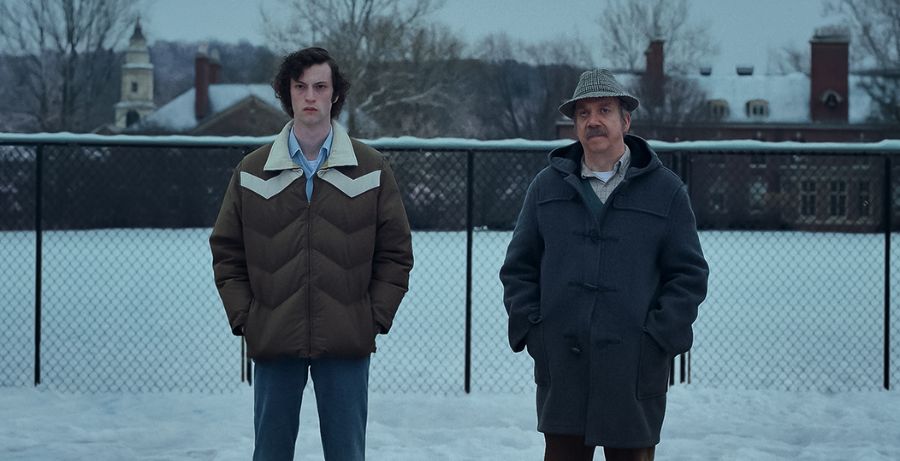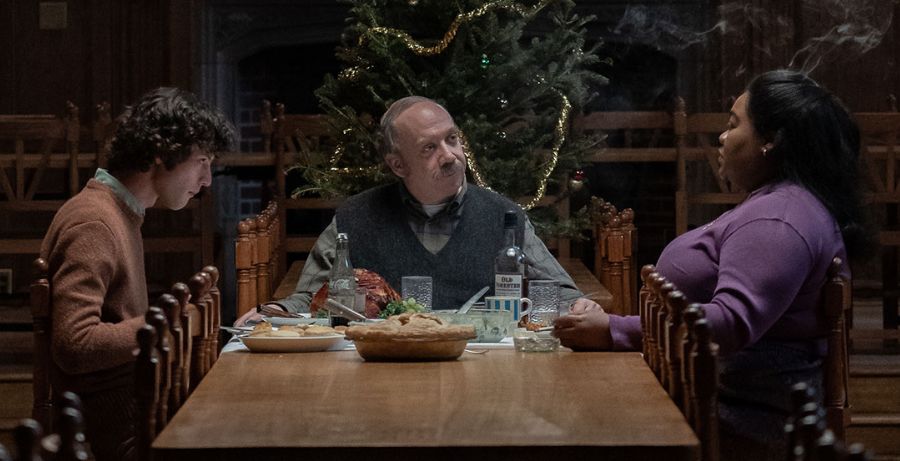On the surface, Alexander Payne’s films don’t seem distinct from every other middling dramedy released in the last decade or so, playing out as semi-tragic comedies with hopeful but not overly cheerful conclusions about people coping with change. Yet, Payne’s vision is so irresistible and comforting in its melancholy that it becomes very easy to get lost in its vibrant dichotomy of heart and humour. Though he doesn’t boast the distinct visual style of a Wes Anderson or David Fincher, Payne separates himself in the way he fixates and reveals his flawed, difficult protagonists’ worst tendencies, while imbuing them with a great level of sympathy.
From Sideways to Nebraska, Payne has explored the lives of average Americans with grace and biting levity, and The Holdovers— his first outing since 2017’s Downsizing, his only misfire—builds on those themes, but does so with an uncharacteristically overt style, one that pays great dividends.
The Holdovers, from its opening logos and titles, oozes an early 70s aesthetic as if plucked from the works of Hal Ashby or Robert Altman. It’s a time capsule that feels timeless in its themes and characters, embracing kindness and understanding as fundamental starting points in the process of recovery. Though it may sound mawkish and saccharine, the film’s authenticity never fails to shine through and take hold of the experience. It’s one of the year’s best films, destined to be revisited for years to come.
The Holdovers is set during the 1970 holiday season at Barton Academy, a fictional Massachusetts boarding school. It is a setting that is ensconced in privilege, catering to the elite and rich at every turn. Paul Hunham (Paul Giamatti, in a performance perhaps too good for the Oscars), a Barton alumni and ancient civilizations teacher, is the one employee who won’t curtsy to the faculty’s agenda, as his harsh, unfettered respect for tradition breeds staunch inconsideration.
Armed with sweaty palms, a lazy eye, and bad body odor, Hunham is the school’s de facto “asshole”, as his students—whom he hilariously calls “hormonal vulgarians”— become the main targets of his dissatisfaction, who believe they can coast off they’re family’s reputation and wealth. Having failed a senator’s son despite the appeals of his headmaster (Andrew Garman), he’s disciplined with a less-than-desirable task: to stay at Barton during the winter break and watch over the students who aren’t being picked up by their parents.

Hunham views this as a perfect opportunity to teach the titular holdovers a lesson, but most of the bunch are carried away in one of the wealthier kids’s helicopters. The only one left is the smart but disruptive Angus Tully (Dominic Sessa, in a stellar debut), whose mother leaves him behind to go on a honeymoon with her new spouse. The two’s dynamic is hostile, only suppressed by Mary Lamb (Da’Vine Joy Randolph), the school’s cafeteria manager, who’s grief-stricken by the loss of her son in the Vietnam War. Trapped together, the three are bitter over their lots in life but rarely see eye-to-eye, with Hunham believing Tully is another entitled brat. Yet, it doesn’t take long for the iciness to thaw, with the three beautifully connecting over their time together, forging a bond over their collective loss, loneliness, and sacrifice.
Over the course of its 133-minute runtime, The Holdovers manifests as a priceless relic of a bygone era, a lost 70s classic that doubles as a new Christmas classic. Its soft, grainy, and textural cinematography transports viewers into its period seamlessly, with the slow zooms and painterly wides skillfully accompanied by purposeful fades and wipe transitions. Its 70s style and tone is never made a gimmick but serves to heighten and buttress the movie as one that’s wonderfully somber and warm, especially when it gives way to an evocative Christmas atmosphere, with the snow-laded locales and musical stings (Damien Jurdado’s “Silver Joy” and Cat Stevens’s “The Wind’ are beautiful bookends) tapping into the inherent, soothing gloominess of the season.
Its humour is arguably its greatest asset, rife with great set-ups and punchlines, including some infinitely quotable one-liners. The Holdovers also approaches its drama in this way, unfolding as character work teeming with catharsis and pathos, building the cast up and then breaking it down ad nauseam. The sentimentality is deftly balanced with its inventive, silver-tongued blend of wit. Moreover, its three-hander has a natural dynamic, a push-and-pull that is heartfelt and earned, slowly morphing into a genuine family unit. It becomes a true joy to bask in their company, seeing oneself in them as they celebrate their small triumphs and giant failings. Payne’s trio of misfits is deeply nuanced, as for as much as it is humorous, there’s a deep-seated sadness at the core of the film that’s equally relatable, revealing, and reassuring.
In reuniting with Payne (their first collaboration being Sideways), Giamatti brings forward a performance that casts a forcefield around his counterparts, actively empowering their work as a result. It’s a possible career best in a career of bests, that is wonderous in its speech and silence, masterful in its comedic and dramatic delivery. Giamatti’s emotive eyes and sullen expressions are profound in their ability to stir and uplift. Randolph lends great texture to each moment while Sessa proves himself to be a star in the making—it’s as sublime as an ensemble can get.
The Holdovers, while evoking the past, is constantly looking forward. In a late moment, Hunham tells Tully that “history is not simply a study of the past but an explanation of the present,” and it’s a sentiment the film compassionately proves, lending great sympathy to its characters who, above all, realize they can’t truly escape their histories but can move forward, nonetheless.
The Holdovers screened as part of the 2023 Toronto International Film Festival.
The Holdovers
-
Rating - 9.5/109.5/10
TL;DR
The Holdovers, while evoking the past, is constantly looking forward. In a late moment, Hunham tells Tully that “history is not simply a study of the past but an explanation of the present,” and it’s a sentiment the film compassionately proves, lending great sympathy to its characters who, above all, realize they can’t truly escape their histories but can move forward, nonetheless.







